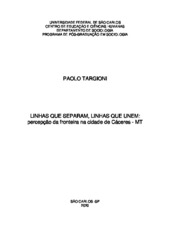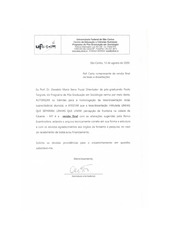| dc.contributor.author | Targioni, Paolo | |
| dc.date.accessioned | 2020-08-14T11:42:28Z | |
| dc.date.available | 2020-08-14T11:42:28Z | |
| dc.date.issued | 2020-07-17 | |
| dc.identifier.citation | TARGIONI, Paolo. Linhas que separam, linhas que unem: percepção de fronteira na cidade de Cáceres - MT. 2020. Tese (Doutorado em Sociologia) – Universidade Federal de São Carlos, São Carlos, 2020. Disponível em: https://repositorio.ufscar.br/handle/ufscar/13157. | * |
| dc.identifier.uri | https://repositorio.ufscar.br/handle/ufscar/13157 | |
| dc.description.abstract | The present study desires to investigate the perception that residents of a border region between Brazil and Bolivia have about the physical border that separates the two countries, as well as other borders that may possibly exist. Initially, in order to support empirical research, were analyzed the work of some of the most important border studies authors. Subsequently, we applied a questionnaire to young students from a university campus in the city of Cáceres (Mato Grosso - Brazil) and then, with the same corpus, were formed focus groups in order to deepen the understanding of the obtained results. The city has been chosen because of its geographical particularity: close enough to the border, so that its residents can get to know it, but also far, to the point that there are people living there who have never approached it. This characteristic meant that the population of the study was composed of people who know the border region very well and others who only have a vague and remote idea, often result of prejudices and stereotypes. Based on the theoretical writings of Sandro Mezzadra on the indeterminacy of the border as well as other authors considered as a reference on border studies, the objective was to better understand if there would be a difference between those who well experienced the physical border and those who do not know it, as in the perception of that, as well as in the perception of other borders (such as gender or ethnic-racial ones) that may eventually arise in our daily lives. The results achieved confirmed the difference in the perception of the indeterminacy of the physical boundary, between the familiar and the unfamiliar with the border, but did not provide significant data relatively the perception of other forms of boundaries. Another important question concerned how would develop the relationship between indigenous residents and those living across the border: foreigners. We were interested in understanding whether there was any difference in this relationship with foreigners between those who know and those who do not know the border, as well as between residents of an urban and a rural area. These hypotheses also were tested through the same interviews, questionnaires and focus groups. The final results, which showed no substantial differences in the relationship with foreigners between those who know and do not know the border, confirmed a different relationship between rural and urban residents. | eng |
| dc.description.sponsorship | Coordenação de Aperfeiçoamento de Pessoal de Nível Superior (CAPES) | por |
| dc.language.iso | por | por |
| dc.publisher | Universidade Federal de São Carlos | por |
| dc.rights | Attribution-NonCommercial-NoDerivs 3.0 Brazil | * |
| dc.rights.uri | http://creativecommons.org/licenses/by-nc-nd/3.0/br/ | * |
| dc.subject | Fronteira | por |
| dc.subject | Sandro Mezzadra | por |
| dc.subject | Border studies | eng |
| dc.subject | Inclusão diferenciada | por |
| dc.subject | Border | eng |
| dc.subject | Differential inclusion | eng |
| dc.title | Linhas que separam, linhas que unem: percepção de fronteira na cidade de Cáceres - MT | por |
| dc.title.alternative | Linee che separano, linee che uniscono: percezione di frontiera nella città di Cáceres - MT | ita |
| dc.type | Tese | por |
| dc.contributor.advisor1 | Truzzi, Oswaldo Mário Serra | |
| dc.contributor.advisor1Lattes | http://lattes.cnpq.br/5005536921435787 | por |
| dc.description.resumo | O presente trabalho teve como objetivo investigar a percepção dos moradores de uma região fronteiriça entre o Brasil e a Bolívia sobre a própria fronteira física que separa os dois países, bem como de outras fronteiras que eventualmente possam existir. Inicialmente, foi realizado um levantamento teórico sobre a sociologia da fronteira com intuito de amparar a pesquisa empírica. Sucessivamente, foi construído um questionário aplicado em jovens estudantes de um campus universitário na cidade de Cáceres (Mato Grosso) e, em seguida, com os mesmos sujeitos, formados grupos focais a fim de aprofundar o entendimento acerca dos resultados obtidos. A cidade foi escolhida por sua particularidade geográfica: suficientemente próxima à fronteira, para que seus moradores possam conhecê-la, mas também longe, a ponto de haver pessoas que nunca tenham se aproximado dela. Esta característica fez com que a população fosse constituída de pessoas que conhecem muito bem a região da fronteira e outras que apenas têm uma vaga e remota ideia, fruto muitas vezes de preconceitos e estereótipos. Baseado nos escritos teóricos de Sandro Mezzadra, e outros autores tidos como referência acerca dos border studies, sobre a indeterminação da fronteira, objetiva-se melhor compreender se haveria diferença entre indivíduos que conhecem a fronteira física e não a conhece (na percepção desta e de outras fronteiras, como de gênero ou étnico-raciais), podendo eventualmente surgir no nosso cotidiano. Os resultados alcançados confirmaram a diferença na percepção da indeterminação da fronteira física entre os conhecedores da fronteira e os não conhecedores, bem como não forneceram dados significativos em relação à percepção de outras formas de fronteiras. Outra questão importante diz respeito a como se desenvolveria a relação entre os moradores autóctones e aqueles que vivem além da fronteira: os estrangeiros. É interessante compreender se é possível haver alguma diferença nesta relação com os estrangeiros, bem como entender se haveria diferença de percepção entre os moradores da zona urbana e rural. Estas hipóteses também foram testadas por meio das mesmas entrevistas, questionários e grupos focais. Os resultados finais, que confirmaram nossas hipóteses sobre a diferente relação com os estrangeiros entre moradores de zona rural e urbana, não mostraram diferenças substanciais na relação com os estrangeiros entre quem conhece e não conhece a fronteira. | por |
| dc.publisher.initials | UFSCar | por |
| dc.publisher.program | Programa de Pós-Graduação em Sociologia - PPGS | por |
| dc.subject.cnpq | CIENCIAS HUMANAS::SOCIOLOGIA::OUTRAS SOCIOLOGIAS ESPECIFICAS | por |
| dc.description.sponsorshipId | CAPES: código de financiamento - 001 | por |
| dc.publisher.address | Câmpus São Carlos | por |
| dc.contributor.authorlattes | http://lattes.cnpq.br/1337701018537707 | por |


